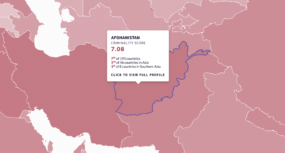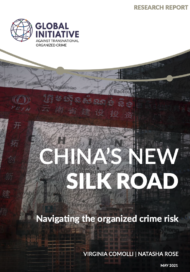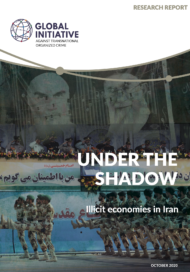Posted on 04 Mar 2020
As Brexit is set to be the defining feature of the UK’s economic future, the same may also be true of its criminal economy.
On 1 February 2020, the UK ceased to be a European Union member state, no less than three years and eight months since its citizens narrowly voted by 51.9% to 48.1% to leave the EU. The UK is currently in the so-called ‘transition period’, which runs until at least 31 December 2020, during which time almost nothing changes. The arrangements for Ireland have been established in the withdrawal agreement, whereby despite the Common Travel Area between Northern Ireland and the Republic of Ireland continuing to operate, and Northern Ireland remaining part of the UK customs territory, a certain degree of customs checks and controls will apply between Northern Ireland and Great Britain. Minister for the Cabinet Office Michael Gove MP, a prominent Brexit supporter, has insisted that the UK will be ‘even safer’ after Brexit as the UK will have full control over its borders.
As negotiations on the future relationship between the UK and the EU are getting under way, we set out to answer two main questions as to how Brexit will change the UK’s criminal landscape. First, what opportunities and risks does Brexit present for criminal groups, and, second, how will exiting the EU impact the capacity of UK law enforcement to respond to the threat of organized crime? Will Brexit see organized crime taking back control, or will Gove’s claim be right?
Organized-crime types that may flourish post-Brexit
Brexit may make the UK more vulnerable to a number of organized-crime markets and underground economies. Experts and policymakers have warned that, once the UK has left the EU’s customs union and thereby has the freedom to impose tariffs on goods while maintaining an open border between the Republic and Northern Ireland, there may be an explosion in cross-border smuggling. Criminal networks may make use of price differentials between the EU and UK to evade customs tariffs and undercut legal goods.
Smuggling economies that exist on the Northern Ireland border may provide some illustration of how this works in practice. While membership of the single market did make import duties on goods standard between Ireland and the UK since 1993, differing tax regimes on fuel, alcohol and tobacco have remained. Smuggling of
counterfeit cigarettes and fuel across the border have become major illegal
activities, carried out by well-organized criminal groups.
These markets are also intertwined with the history of the Northern Irish conflict, as many of the criminal networks currently smuggling fuel and tobacco (as well as controlling other illegal markets in the Republic and Northern Ireland) are groups of both republican and loyalist paramilitaries who have expanded into organized-criminal activity. It follows that expanding the range of goods for which there are price differences between Ireland and the UK opens up opportunities for cross-border smuggling that these groups can capitalize on.
A 2019 British-Irish parliamentary inquiry into illicit trade and the border found that that ‘the 224-mile open border between Ireland and Northern Ireland represents a significant risk in terms of fuel and tobacco smuggling’ and that any divergences in tariffs and prices between jurisdictions create opportunities for organized criminals to make significant profits.
Another emerging criminal business opportunity will be human smuggling and trafficking. Limits on immigration to the UK, particularly for low-skilled job-seekers, will be lowered under a newly unveiled points-based system following Brexit. Employers in sectors such as agriculture and hospitality have said that this will put a
constraint on supply in these areas of the labour market. This could, in turn, spark
an increase in the number of migrants working in the country illegally, both of
their own free will and under duress. Human-rights organizations focusing on
modern slavery have voiced concerns that the new policy could drive
coercion and abuse, stimulating a black market for low-skilled labour.
The Irish border could become an increasingly popular conduit for human trafficking. Joint operations between Irish and UK law enforcement have investigated Eastern European (particularly Romanian) and Nigerian organized-crime groups that have used the Common Travel Area between Northern Ireland and the Republic for human trafficking destined to the UK. This route, from Ireland to the UK, is reportedly seen as less challenging for criminal groups to manoeuvre. So, as trafficking routes through other entry points to the UK mainland may well become more difficult to navigate as the UK immigration regime tightens, traffickers could increasingly exploit this seemingly easier route through the Common Travel Area.
Major flows of illegal drugs into the UK are routed through the EU. The Netherlands and Belgium are the primary waypoints for South American cocaine en route to the UK (which, according to recent estimates, is currently responsible for up to one-third of all cocaine consumption in the EU) and the primary sources of synthetic drugs, such as MDMA and methamphetamines. Most heroin consumed in the EU and the UK arrives in the bloc overland from the eastern supply markets via the Balkans. Any move that hinders cooperation between EU and UK law enforcement, or increases disruption at ports and overstretches customs authorities, will be a
boon for drug traffickers plying EU–UK routes.
Even as the UK government attempts to position itself as having a new ‘global’ outlook to investors post-Brexit, leaving the EU may increase the ease with which criminal groups can launder money through the UK economy.
A strategic assessment from the UK National Crime Agency (NCA) warned,
somewhat cryptically, that as UK businesses look to increase the amount of
trade they have with non-EU countries after Brexit, the likelihood that they
will be ‘drawn into corrupt practices’ will increase. The UK already has a long-held reputation for being more permissive of UK-based businesses engaging in corrupt practices overseas than are law-enforcement counterparts elsewhere, for example in the US.
A key weakness in the UK’s illicit financial flows regulatory framework is the ease
with which shell companies can be established in the country.
At the same time, legal commentators have suggested that the Serious Fraud Office, the UK’s oversight body, will begin to take a less aggressive stance against corporate corruption, so as not to ‘test the patience of the government amidst a post-Brexit Britain keen to attract investment’. It seems that, at the same time as the incentives for corruption are increasing as UK businesses expand their international portfolios, the oversight mechanisms to prevent it are being disempowered.
Will UK authorities be able to respond?
While the impact of Brexit on these specific organized-crime markets is potentially very serious, perhaps the most damaging outcome of the UK’s decision to leave the EU will be a reduced law-enforcement capacity to respond to organized crime. Although the two parties have stated their commitment to a security partnership comprising ‘law enforcement and judicial cooperation in criminal matters’, by virtue of no longer being an EU member state, the UK will lose access to vital resources.
Full membership of Europol, for example, the pan-European law-enforcement agency, is open only to EU member states, and although the Political Declaration calls for working together to ‘identify the terms for the United Kingdom’s cooperation via Europol and Eurojust’, it is inevitable that UK access to Europol resources will be reduced. In practical terms, the UK is all but guaranteed to forfeit
access to real-time data and will instead be required to submit case-by-case
requests.
Furthermore, the UK will no longer be able to influence which cases Europol should prioritize, as they will lose their seat on the management board. Indeed, Michel Barnier, the EU’s chief Brexit negotiator, has said that ‘the UK will not be in a position to shape the strategic direction of EU agencies’. Some experts believe that the most likely outcome post-Brexit would be a form of ‘second-tier membership’ of the law-enforcement agency, which would be more politically feasible, but they note
the clear ‘operational drawbacks’, including being ousted from its authority to
lead investigations, the aforementioned loss of influence on an organizational level,
and the lack of full access to Europol’s databases.
Given that UK agencies carry out approximately 250 000 searches of Europol databases a year, there is an awful lot at stake. The fact that the NCA have allegedly been harvesting information from the Schengen Information System II (SIS II), according to a leaked report,
shows how detrimental UK law-enforcement agencies believe the loss of access
will be. The weapons available in Europol’s armoury include the European
Intelligence System, the Secure Information Exchange Network Application and
the European Union Bomb Data System, among many others. These resources contain information on criminal structures, serious international crimes, suspected and convicted persons and criminal activities, as well as providing for ‘the secure and swift transmission of sensitive and restricted data’. The departure of the UK from Europol is likely to have negative implications for the EU too, however, as the UK is among the largest financial contributors to the agency and among the
top three leading contributors of intelligence.
Another crucial tool bestowed upon the UK through its membership of the EU is the European Arrest Warrant (EAW), which provides for the automatic extradition of individuals, valid throughout EU member states. In 2016/2017, 1 735 individuals were arrested in the UK as a result of the EAW, and around 1 000 individuals per year in the UK are surrendered to EU states. It is difficult to overstate the importance of this law-enforcement tool for the UK’s security. During her time as Home Secretary, former UK Prime Minister Theresa May argued that losing access to the EAW would turn the UK into ‘a honeypot for all of Europe’s criminals on the run from justice’.
We have already been given a first taste of what life outside the EU means for the UK in law-enforcement terms, as Austria, Germany and Slovakia have notified the EU that they will no longer extradite their own nationals to the UK owing to provisions in their constitutions that forbid the extradition of nationals to non-EU states. Although these countries will still be able to extradite non-nationals to the UK, the shift nevertheless represents a blow to the UK’s security standing.
If negotiations between the UK and the EU were to completely break down, the UK would be able to fall back on the European Convention on Extradition.
However, as has been pointed out by legal experts, extradition by means of this process takes up to 20 times longer, mainly because it needs to be done through diplomatic channels, in other words, with political involvement, rather than automatically, as Is the case with the EAW. Moreover, the convention doesn’t impose the strict time limits on extradition that the EAW does nor does it oblige participating countries to extradite their own nationals.
Other options include bilateral agreements with individual countries, which could take a considerable amount of time to conclude and would vary in quality and comprehensiveness, or a Norway/Iceland-style surrender agreement, which may prove even harder to negotiate and would still allow countries the option to refuse extradition o their own nationals. Given the intertwining of both UK and EU citizens in the supply chains of various transnational organized-criminal markets, this would make bringing suspects to justice a lot more difficult. The Home Affairs Select
Committee concluded that ‘the closer the UK wants to remain to the status quo in its extradition arrangements after Brexit, the more likely it is that the EU will demand a stronger role for the Court of Justice of the EU’. Given Boris Johnson’s adamance that the European Court of Justice should play no role in the future relationship between the UK and the EU, it is unlikely that the UK will accept such a settlement.
Other important measures and agencies currently accessible to the UK are the SIS II, which gives access to real-time alerts and information on missing and wanted people; the Passenger Name Record database, which gives access to information on passengers on flights to and from the EU; the Prüm Convention system, which allows access to other member states’ national databases for DNA profiles, fingerprints and vehicle registration data; and the European Criminal Record Information System, which enables automated exchange of criminal record data. If by 31 December 2020 no future relationship agreement were to be in place, the UK would automatically lose access to all of these crucial law-enforcement tools.
Despite the numerous potential ways in which the UK may have reduced access to security resources post-Brexit, both the UK and the EU have expressed in their respective negotiating mandates their desire to agree to mechanisms by which criminal justice and law enforcement cooperation may continue. And although the EU has made it clear that the UK will be limited by its status as a non-Schengen third country, they appear to be willing to go further than current precedent would seem to allow. Nevertheless, while it is in both parties’ interests to maintain as close a security partnership as possible, the legal and technical barriers may outweigh political goodwill on the issue. The UK government’s so-called ‘red lines’, including not being subject to oversight by the European Court of Justice, may limit the scope of future arrangements, no matter how much they may like to have their ‘gateau’ and eat it.
In short, the exact nature of the future relationship, both economic and on security policy, between the UK and the EU is still unknown. However, what is clear is that Brexit has demonstrated how global the criminal economy is and how difficult it is to
disentangle a raft of agreements and institutions designed to ensure effective law enforcement across borders. While the NCA has said that some of the impacts of Brexit have the ‘potential to work in favour of law enforcement, including greater discretion over the movement of goods and people’, there is a significant risk, if not an inevitability, that the UK’s ability to prevent and respond to organized crime will be diminished as a result of reduced access to EU databases, tools and resources, at just the time when criminal actors will be seeking to take advantage of the new opportunities to make illicit profits in the changing economic landscape.



